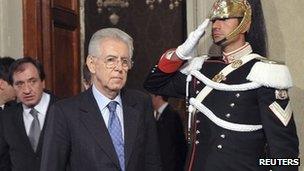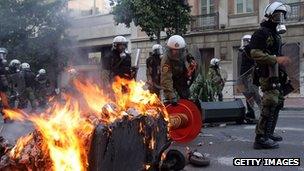The euro – what next?
- Published
- comments

Italians may give Mr Monti a chance at first but he will have to make unpopular decisions
The long knives have flashed. Silvio Berlusconi, who had come to resemble a Roman emperor, left power under a hail of coins and with the strains of the Hallelujah Chorus ringing in his ears.
George Papandreou - the madman in French President Nicolas Sarkozy's judgement, according to leaked reports of his conversation with President Barack Obama - has been toppled off his perch in Athens. The rule of the technocrats has begun. For Italy and Greece their script will be written in Berlin, Paris and Brussels. The people have only been onlookers as governments have fallen and been replaced by the unelected.
There is a myth about technocrats: that there exists out there a group of disinterested officials, above party politics, who can govern in the interests of the nation. For a brief moment Mario Monti - the ex-EU commissioner who will be the next Italian prime minister - will enjoy a honeymoon.
Italians weary of the Berlusconi years will give him a chance. But as an Italian MP said to me last week outside the parliament, every step he and his cabinet of technocrats takes will be political. There is nothing more political than legislation on pensions, wages and taxes.
Over the weekend the Italian parliament passed a series of austerity measures and reforms.
These had been hurriedly assembled by Silvio Berlusconi and taken to the summit in Brussels in a "letter of intent". Much of the detail is missing. Indeed some MPs had only a scant idea of what was in the package they were assenting to. Mario Monti will now have to flesh out these plans and then parliament will vote on them.
It will not be straightforward. Roberto Maroni from the Northern League said: "Parliament must have the guarantee of an opposition otherwise it won't be a democratic parliament." Politicians have been cowed by the dangerous winds of the markets but they have not gone away.
Anaemic economies
As so often with the eurozone crisis, time has been bought but not much more and here's why.
Italy's economy is anaemic. There will be virtually no growth this year or next. Its debt mountain is growing. As the economist Nouriel Roubini points out, Italy needs a primary surplus of over 5% of GDP just to stop its debt exploding.
And next year parts of Europe look as if they are heading into recession.
And the austerity measures that Mario Monti will now have to oversee will, in the short term, only make matters worse, as they have in Greece.

Greece has already seen angry protests against austerity measures
The structural reforms which will strengthen growth and boost unemployment will take time. They are slow burners.
The protesters so keen to see the back of Mr Berlusconi will eventually return to the streets as they learn the details of the austerity measures that have to be passed. There is plenty to arouse opposition: the raising of the retirement age, the opening up of closed professions and the selling off of state assets.
Then there is Greece. Here, too, the welcome mat will be out for the new government. Lucas Papademos, a former banker, will be given time by the public. He should pass a vote of confidence on Wednesday. Then the parliament must ratify the bailout deal before receiving 8bn euros (£6.9bn) without which Greece will default in December.
Time is short. The protesters will be back on the streets of Athens this week. Unemployment has soared to 18% - even during August, a good month for hiring. Under the bailout the banks will accept 50% losses on their holdings in Greece. That will reduce Greece's debt mountain of 350bn euros by a third by 2020. That is on the most optimistic reading.
The EU's main bailout fund, the European Financial Stability Facility (EFSF), which on 27 October was announced as having the firepower of a trillion euros, lies in limbo. Foreign investors have sat on their hands. The Europeans have not put in more money.
Other countries will come under market scrutiny - Spain, in particular. It is holding elections this week. The socialists almost certainly will be replaced by the centre-right. But the incoming administration is caught in a vice. It, too, will have to introduce new austerity measures while unemployment at over 20% is shocking.
France, too, knows that it is close to losing its treasured triple AAA rating.
There is an uncomfortable truth that lies behind this crisis. Europe cannot afford the welfare state it has embraced over the past 50 years. In France its social model is seen as defining its way of life. But in order to pay down its debt Europe may have to sacrifice many of the benefits.
Meanwhile, pressure is mounting on the Germans to allow the European Central Bank to become the lender of last resort. This pressure will grow because the other solutions are not working. A senior and smart economist, who works in the European Commission, said to me some months back that "in the end they'll opt for printing money".
The German position is that of Jens Weidmann, head of the Bundesbank. He said again this weekend: "Monetary financing [of government debt] will set the wrong incentives, neglect the root causes of the problem, violate the legal foundation on which we work and destroy the credibility and trust in institutions."
Can the German line hold? It is the battleground for the weeks ahead.